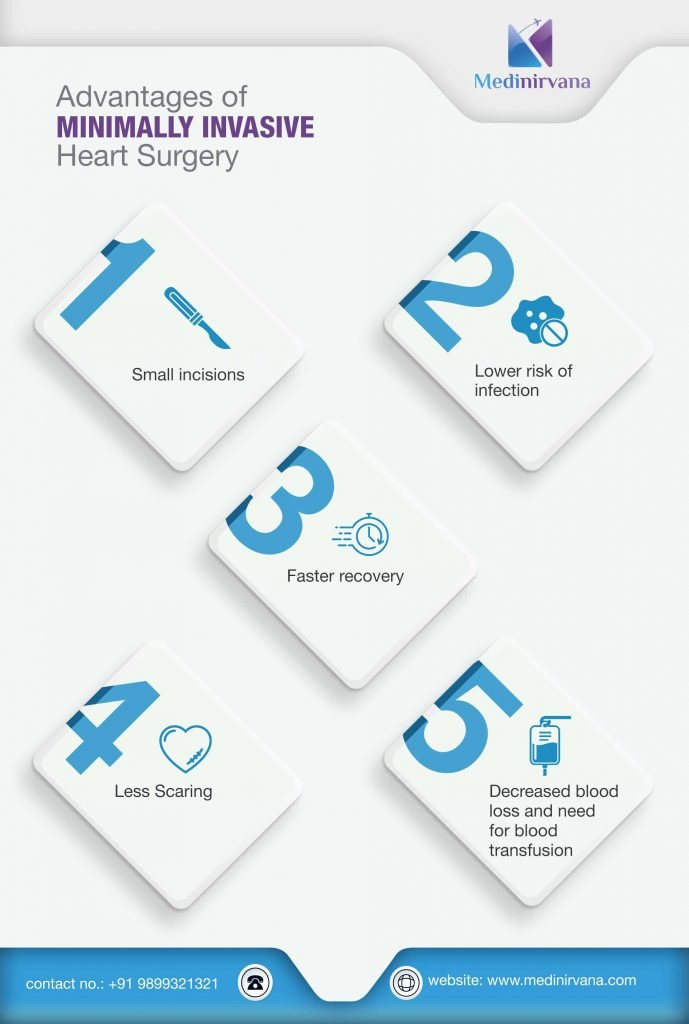In recent times, cardiac surgery has gone through many advancements right from catheter-based trans-catheter valve technology, minimally invasive surgery, and the most advanced robotic surgery. Cardiac surgeries are one of the most complex surgeries and these recent innovations are making it less invasive, faster recovery, and much safer than before with excellent outcomes. The minimally invasive approach has been becoming popular for many such advantages.
Many patients in developed countries like the US, UK, Canada are seeking cheaper and efficient medical services in other countries. India is the rightful place for cardiac surgeries with a technological edge and a large pool of skilled medical professionals. The country has treated thousands of heart patients from across the world with high success rates and the numbers are rising every year.
Table of Contents
Feel free to skip ahead if one topic catches your eye:
- What is Minimally Invasive Cardiac Surgery?
- How should you prepare yourself for Minimally Invasive Cardiac Surgery in India?
- Before and After surgery care
- Alternatives of Minimally Invasive Heart Surgery
- Cost of Minimally Invasive Heart Surgery in India
- Why Choose India for Minimally Invasive Heart Surgery?
1. What is Minimally Invasive Cardiac Surgery?
Most of the cardiac surgeries which are conducted in minimally invasive manner include:
- Aortic valve replacement
- Tricuspid valve repair or replacement
- Mitral valve repair or replacement
- Atrial septal defect
- Atrioventricular septal defect surgery
- Atrial fibrillation
- Coronary artery bypass surgery
In heart valve surgery, the surgeon replaces or repairs the damaged valve of the heart. The heart has four types of valves namely aortic, mitral, pulmonic, and tricuspid valves. When valves are damaged or diseased they cause a condition of valve stiffness or leaky valves. In such cases, the diseased valve can be repaired or the entire valve can be replaced with an artificial valve. In the traditional method or open-heart surgery approach, a large incision is taken on the chest, and the valve is repaired. The minimally invasive approach is performed without splitting the breastbone and fully opening the chest and offers many other benefits. Robot-assisted surgery offers better precision and excellent results.
What is the Procedure?
Commonly, minimally invasive heart surgery follows this process:
First, you will be asked to fast for 8 to 12 hours prior to surgery.
Before the procedure, you will be given anesthesia through the intravenous (IV) line in your arm or hand. Your blood pressure, heart rate, oxygen level will be monitored throughout the surgery.
Once you are ready, the surgeon will make a small incision of approximately 5 to 6 cm. The incision is made in the sternum or on the side of your chest.
Next, your surgeon will insert a flexible tube called an endoscope with a camera attached to the end through the incision. Other required instruments are also inserted through this tube.
With the help of a camera, the surgeon and the team can get a clear view of the valves, on screen. Using the surgical instruments, the surgeon will repair or replace the damaged part of the valve and enable.
Once the surgeon is satisfied with the functioning of the repaired valve, the endoscope is taken out. The incision is closed with stitches and covered in bandages.
Once discharged from the hospital, patients with minimally invasive heart surgery, recover faster and there are minimal restrictions. Most patients will get back to their usual routine in a month. By following your heart surgeon’s instructions and a healthy lifestyle you can continue to live a normal life.
2. How should you prepare yourself for Minimally Invasive Cardiac Surgery in India?
If you are planning to travel to India for minimally invasive heart surgery, first choose the best hospital with all the necessary amenities and a well qualified surgeon to perform the procedure.
Discuss with your heart specialist in India about the procedure, duration of stay required, risk involved for traveling before and after the procedure. For minimal heart surgery, you will be required to stay for 2 to 5 days. You can travel back only when your doctor certifies that you are fit for a journey.
Make sure your heart specialist in India is well aware of your medical history, current health status, allergies, etc.
In India, most hospital staff is well versed in English. If you do not speak English, make sure the hospital provides a translating service.
Carry copies of your medical records, recent test reports, scans, etc along with the list of the prescribed medicines you are taking.
Before surgery, your surgeon will explain the procedure and answer your queries. You will be asked to take a few tests to ensure you are in good health for surgery.
Also, you will be asked to stop smoking or alcohol consumption for at least two weeks before surgery to avoid any complications.
Follow the instructions by your surgeon for a quick and successful recovery.
3. Before and After surgery care
Pre and post surgery care:
Pre surgery:
You may experience the following symptoms if your heart valve is damaged:
- Chest pain
- Breathing problems, shortness of breath
- Dizziness
- Swelling of feet, ankles, or belly
The heart specialist will run different tests to identify the problems and recommend the best procedure to rectify it. These tests will include:
- Chest x-ray (for checking the anatomy of the chest)
- Electrocardiogram (for checking the heart rhythm)
- Pulmonary function test (for testing functioning of the lungs)
- Blood tests (for blood counts)
In order to decide what type of surgery will be best, the surgeon considers factors like age of patient, typeof cardiac problem and general health.
Discuss with your heart specialist about your concerns, your medical history, general health, what medications you are taking currently, your allergies, etc. Your surgeon will also explain the procedure, type of anesthesia required and risk factors.
You will be asked to avoid certain medicines such as blood thinners, arthritis medicines, etc for a few days before surgery.
Also avoid smoking and alcohol consumption for at least 2 weeks prior to surgery to avoid any complications.
You will be asked to fast for 10 to 12 hours beforehand and a few additional tests will be run to check you are otherwise fit for surgery.
Avoid carrying jewellery items or valuables to the hospital. Also make sure you are not wearing any nail polish, make up, dentures during the surgery.
Post surgery:
- Post-surgery, you may experience some pain and discomfort. Your doctor will prescribe some pain medications for managing pain. You will be required to stay in hospital for two to five days.
- After discharge, within two to four weeks time, you can resume your normal routine. A follow-up routine will be scheduled for monitoring your progress.
- You will be advised to follow the course of medications and make a few lifestyle modifications. This will help to maintain a healthy heart.
- To improve the chances of success, quit smoking as soon as possible, keep your blood pressure and cholesterol in control, and maintain a healthy weight regime (BMI). The procedure has proven very successful in treating many complex heart disorders as it reduces the risk of any postoperative complications.

4. Alternatives of Minimally Invasive Heart Surgery
The alternative to minimally invasive cardiac surgery is open heart surgery. For traditional open-heart surgery requires taking at least a 20 cm incision and thus a longer time to heal and return to normal activity. Minimally invasive procedures offer better control of equipment, minimum risks, and excellent outcomes.
For patients, the minimally invasive approach offers many benefits including:
- Small incision and thus less blood loss during and after the procedure
- Less surgical trauma
- Reduced risk of infection
- Faster recovery
- Reduced pain period
The procedure is highly beneficial for patients with diabetic conditions or for aged people with a higher risk of infection. All the blockages can be thus treated in a safe and careful manner.
5. Cost of Minimally Invasive Heart Surgery in India
The cost of the treatment is depending upon following factors:
- Medical team and technology factors: Fees of surgeon, Fees of anesthetic, type of procedure and technology used, etc.
- Hospital factors: reputation and location of hospital, duration of stay, amenities used, etc.
- Patient’s factors: Age, severity of condition, additional treatments required, etc.
In India, the average cost of the treatment ranges between 2.8 lakhs to 4.5 lakhs.
6. Why Choose India for Minimally Invasive Heart Surgery?
Cardiac surgeries are complicated and it is crucial to choose the right hospital and the right surgeon for the successful outcomes. India offers following benefits over other countries:
- Qualified surgeon: Well qualified, and experiences surgeons are available providing excellent services
- Professional and world class services: The country is known for providing high standard services as that in most western countries.
- Affordable prices: The expenses of treatment and travelling are cheaper than any other western countries.
- Additional treatment: Healthy meals, rejuvenation facilities are offered to support your treatment.
Take away
The goal of minimally invasive heart surgery is to repair or replace the defective valve of the heart to prevent heart failure and death. In India, the skilled team of surgeons have trained at the world’s leading hospitals ensuring that you benefit from the most advanced technologies available. Most importantly, the surgery is available at affordable prices.






Leave a Reply